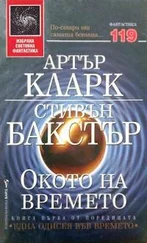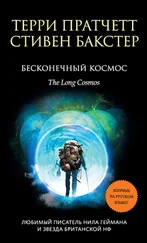Greenberg accepted the necessity of the migration. But to him it had been a drain, not just on the system's titanic population, but on the human spirit.
The solar system had been left a drab, depopulated place. All the engineering types had gone, leaving behind the navel-gazing seals of Ra, and similar relics scattered around the system.
The Weissmans, turned in on themselves, had their own interests. They were probing into a lot of areas well beyond his expertise. Like the possibility of tapping into zero-point field
energy, the energy of the vacuum itself, so dense you could - it was said - boil all the oceans of Earth itself with the energy contained in a coffee cup of empty space. Then there was the compact energy stored in topological defects, little packets of space that had gotten tangled up and folded over in the Big Bang, containing some of the monstrous primeval energies within, just waiting to be tapped and opened up…
Research and development, carried on by a community of goddamn seals, with no hands or tools. Greenberg didn't know how they did it. It was one of the many things about the Weissmans he didn't understand.
He did know they were trying to extend their consciousness. Mind, it seemed, was a quantum process, intimately bound to the structure of space and time. And in space, after ten thousand years free of the distortions of the muddy pond of atmosphere at the bottom of Earth's gravity well, consciousness - the Weissmans claimed - was taking a huge evolutionary leap forward, to new realms of power and control and depth.
Maybe.
To Greenberg, it was all very well to dream of super-minds of the future, but right now, he suspected there was nobody left, for instance, who was giving thought to pushing a troublesome asteroid out of its orbit, where once the children of man had rearranged worlds almost at will.
And, Greenberg was coming to realize, that might make a big difference in the future.
He still had some of his old monitoring systems, or patiently reconstructed copies anyhow. He studied Ra's evolving trajectory around the sun.
And, gradually, he'd learned something that had disturbed him to his core.
Near-Earth asteroids wandered in steadily from the main belt, their orbits tweaked by the gravity of Jupiter, Venus, Mars and Earth itself. They hung around for thirty megayears or so, their orbits slowly evolving. Then they would encounter one of three fates, with equal probability: they would hit Earth, or hit Venus, or be slingshot out of the system altogether.
The cratering record on Earth showed this had been going on tor billions of years. The smaller the object type, the more frequent the collision. Every few thousand years, for instance, Earth would be hit by an object a hundred metres or so across, big enough to
dig out a new Meteor Crater, as in Arizona, where Apollo Moonwalkers had once trained. Earth had actually suffered a few fresh strikes like that while Greenberg had been observing.
And every few tens of millions of years, a much larger body would strike.
Such an object had struck the Earth sixty-five million years ago, at Chicxulub in Mexico. It had caused the extinction of most of the species extant at that time.
It was known as the dinosaur killer.
Earth was overdue for another impact like that.
Near-Earth asteroid orbits were pretty much chaotic. It was like the weather used to be, back when he lived in a place that had weather. But as computers had gotten smarter, the path of Ra-Shalom had been pushed out, in the computer's digital imagination, further and further. Finally it had become clear to Greenberg what Ra's ultimate fate would be.
Ra wasn't going to hit Venus, or be thrown out of the system to the stars. Ra was going to hit Earth.
Ra was the next dinosaur killer.
It was a long time ahead: all of a million years from now. But it worried him that right now, nobody seemed to know how to deflect this damn rock.
Whenever he got the chance, he sounded off about the dinosaur killer problem. The Weissmans told him they had plans to deal with it, when the time came. Greenberg wasn't sure whether he believed that.
And he wasn't sure he wanted to be around to see this chewed-up rock auger in on the surface of the planet where he was born. But he couldn't turn his back.
Within the confines of the tiny world, civilizations fell and rose; by turns, the refugee race fell to barbarism, or dreamed of the stars. The guardians had planned for this.
But the little world was not stable. This they had not antici-pated.
Its orbit was close to a resonance with that of Jupiter: it circled the sun three times in each of Jupiter's stately years. The powerful tug of Jupiter worked on the asteroid's trajectory, millennium after millennium.
Quite suddenly, the orbit's ellipticity increased. The asteroid started to swing deep into the warm heart of the solar system.
There was nothing the inhabitants could do to steer their rock. Some adapted. Many died. Superstitions raged.
For the first time, the asteroid dipped within the orbit of Earth.
Scale: Exp 5
... Crossing time in unimaginable jumps, drifting between sleeping and waking, eroding towards maximum entropy like some piece of lunar rock…
He never knew, he didn't understand, he couldn't believe how much time had passed. A hundred thousand years? It was a joke.
But even the sky was changing.
The nearby stars, for instance: Alpha Centauri and Barnard's Star and Sirius and Procyon and Tau Ceti, names from the science fiction of his youth. You could see the changes in the light, the stain of oxygen and carbon, chlorophyll green. Even from here you could see how humans, or post-humans anyhow, had changed the stars themselves.
And to think he used to be awed by the Vehicle Assembly Building at Canaveral.
And the expansion must be continuing, further out, inexorably. On it would go, he thought dimly, a growing mass of humanity filling up the sphere centred on Sol, chewing up stars and planets and asteroids, until the outer edge of the inhabited sphere had to move at the speed of light to keep up, and then what would happen, he wanted to know?
But none of that made a difference here, in the ancient system of Sol, the dead heart of human expansion. It was hard for him to trace the passing of the years because so little changed any more, even on the heroic timescales of his intervals of consciousness.
Conditions in a lot of the inhabited rocks had converged, in fact, so that the worlds came to resemble each other. Most of them finished up with the kind of simple, robust ecosystem that sustained Ra, even though their starting points might have been very different. It was like the way a lot of diverse habitats on Earth -forests and jungles and marshes - would, with the passage of time, converge into a peat bog, the same the world over, as if they were drawn to an attractor in some ecological phase-space.
And most of the rocks, drifting between uninhabited gravity wells, were about as interesting as peat bogs, as far as Greenberg was concerned.
Meanwhile, slowly but inexorably, life was dying back, here in the solar system, which had once hosted billions of jewel-like miniature worlds.
There were a lot of ways for a transformed asteroid to be destroyed: for instance, a chance collision with another object. Even a small impact on a fragile bubble-world like Ra could puncture it fatally. But nobody around seemed capable of pushing rocks aside any more.
But the main cause of the die-back was simple ecological failure.
An asteroid wasn't a planet; it didn't have the huge buffers of mass and energy that Earth had. A relatively small amount of matter circulated in each mass loop, and so the whole thing was only marginally stable, and not always self-recovering.
Читать дальше
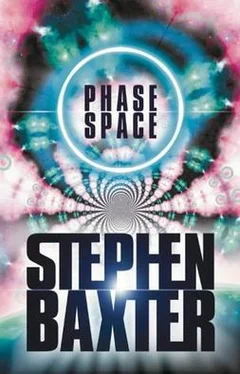
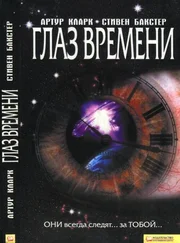

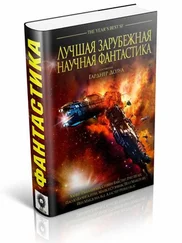
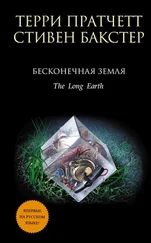
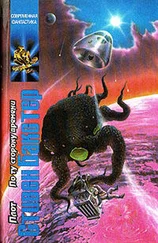
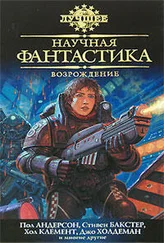


![Стивен Бакстер - Бесконечный Космос [litres]](/books/415680/stiven-bakster-beskonechnyj-kosmos-litres-thumb.webp)
